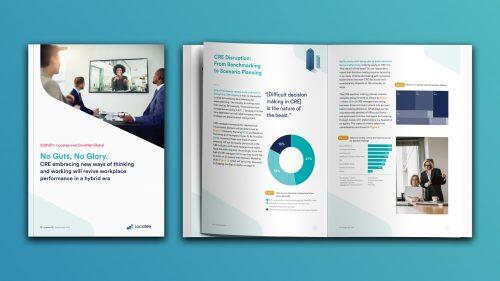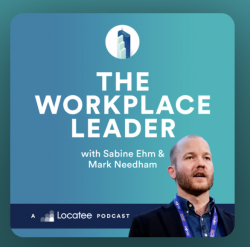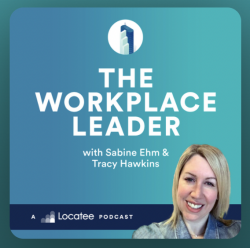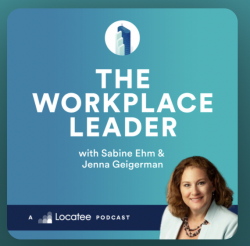When Zurich-based workplace analytics and insights provider Locatee first landed on the CRE scene, its team had already established a clear understanding of the important role data plays for commercial leaders. However, seven years later, few individuals or companies could have predicted that this information would also play a critical role in bringing the world’s commercial real estate industry back from the brink of virtual ruin.
The CRE landscape has undergone seismic shifts since Q1 of 2020. Specifically, as of February 2022, offices have been 94 percent empty on average, per Locatee’s utilization data. In Manhattan, among those who remained open, a Partnership for New York City survey cites 54 percent of workers being fully remote and nearly 40 percent are hybrid. For the insights and data to drive these crucial decisions, corporate leaders worldwide look to Locatee. The Real Deal secured an exclusive interview with Sabine Ehm, Locatee’s Thought Leader and Research Manager to better understand how their team is working globally to help CRE leaders navigate through these return to work challenges.
A Platform to Discover Opportunities
Locatee is a Swiss-branded company whose platform integrates into commercial space to offer immediate insight into whether workspaces are being used efficiently and are compliant with ESG benchmarks or financial guidelines. Already prior to the pandemic, office managers and other leaders have been able to use these resources to optimize their efficiency. Today, numerous successes have allowed the company to expand their footprint into the United States. At Zurich Insurance’s headquarters, as one example, Locatee’s data was used to monitor daily peak utilization, allowing the company to develop new strategies to reduce occupancy in zones of high utilization and generate actionable data on a daily basis. Deloitte was also able to use Locatee real-time utilization data to optimize cleaning routines, saving resources and costs, while adhering to higher cleaning standards reflective of the increased emphasis on quality and hygiene during the pandemic. The flexibility opportunities that Locatee highlights through real-time data have consistently proven to be key catalysts for companies to adapt – an aspect that made the service a necessity for some companies to survive the recent pandemic.

“Since 2020 it’s been established that some companies will still have offices for various reasons, but the success criteria for that has very much changed,” Ehm said. “Many workplace managers aren’t sure what those are anymore, and we give them a source of ideas. Regardless of how advanced a customer’s plans are on how to adapt and tap into the data, the amount of information we provide helps them pick and choose what’s helpful for their specific programs and strategies.”
Exclusive and In-Depth Data
Among Locatee’s most impressive and standout assets over the past two years is the amassing of workplace utilization data. This data tracks how much of an office’s space is being occupied, providing both a comprehensive overview of the pandemic’s effects on the commercial landscape and a unique method of tracking utilization trajectories on a global scale that cannot be found anywhere else. To date, this information notes the slow return to office being seen throughout the United States that is being reflected in many parts of Europe; in contrast, countries such as China and South Korea have seen a lesser correlation with the pandemic’s ebbs and flows, and been more difficult to predict.

“Our graphs show that office utilization in large corporations is very slowly creeping up on average and remains extremely low in the USA at below 10 percent – far below the 60 percent averages pre-pandemic,” Ehm explained. “However, the “peaks” at the office are increasing at a faster rate in early 2022. This shows the clear realization of hybrid patterns this year, and that people don’t come much to the office but they tend to congregate for meetings and collaborations, using the office to do so. Should this trend continue, utilization rates towards the end of Q2 may be around 25-30 percent on average with peaks in the 40 percent range.”
Adapting to Modern Needs
With the CRE landscape facing unprecedented circumstances, Locatee has spent the past two years meticulously compiling data, organizing seminars/webinars, publishing multimedia and issuing reports and white papers that have guided the commercial real estate industry through these challenging times. This content and thought leadership, which also consistently features contributions from leading industry experts, is specifically geared to reflect the unique challenges that corporate landlords and tenants face during this time. This includes such topics as how to properly implement technology to achieve a hybrid work environment, reassessing which KPIs office leaders should be focusing on in today’s climate, how to engage and attract workers back to the office and which corporate strategies will have the most significant impact over the next ten years given today’s trends.
“Having worked in corporate real estate myself and attending many events, I’ve always found it incredibly valuable to hear how other companies are maneuvering these challenges and how they are structured,” Ehm explained. “So we often take insights from our podcast conversations and other workshops and translate them into our written thought leadership.”
 “No Guts, No Glory,” a whitepaper based on a survey conducted across 97 CoreNet Global members, is particularly relevant in this regard. With a sample size that spans the globe, it identifies the new ways of thinking and working that CRE management can use to evolve the employee experience and provides an overview of what is soon to be in place. Among its findings were that 85 percent of respondents would be moving to a model of 2-3 days of remote work and that 90 percent of European firms plan to have unassigned seating configurations within the next two years. It also found that 75 percent of CRE managers noted “Employee Well-Being” as an important criteria in their decision making process – a key point that likely influences whether employees would feel safe returning to in-person work.
“No Guts, No Glory,” a whitepaper based on a survey conducted across 97 CoreNet Global members, is particularly relevant in this regard. With a sample size that spans the globe, it identifies the new ways of thinking and working that CRE management can use to evolve the employee experience and provides an overview of what is soon to be in place. Among its findings were that 85 percent of respondents would be moving to a model of 2-3 days of remote work and that 90 percent of European firms plan to have unassigned seating configurations within the next two years. It also found that 75 percent of CRE managers noted “Employee Well-Being” as an important criteria in their decision making process – a key point that likely influences whether employees would feel safe returning to in-person work.
“Other reports, such as “Are We There Yet?” provide more of a retrospective and a chance to explore the lessons learned over the pandemic and how they might influence the post-pandemic ‘new normal,’” Ehm states. “Today, when some sources of media are quick to jump on bold statements that question whether or not we even need commercial real estate anymore, it’s important to provide information about what is actually happening in the landscape and what it will mean going forward.”
Gathering Leaders Across Mediums
Locatee also regularly taps industry leaders for more on-the-ground and organic information. Through a wide variety of seminars and webinars, such as the recent “Engage and Attract: The Office Reimagined” and its publicly available podcast, “The Workplace Leader,” Locatee assembles and speaks with key CRE executives to learn more about their decision-making processes, priorities, strategies and methods of shaping the next generation workplace. Notable appearances on The Workplace Leader include Mark Needham, EMEAR Hybrid Workleader, Webex and Workplace Transformation at Cisco, Tracy Hawkins, Vice President of Real Estate and Workplace and Remote Experience at Twitter and Jenna Geigerman, Director of Real Estate & Strategy at Citrix. The podcast launched in January of 2021 and is released weekly, with video snippets also being available on YouTube.
“We created this podcast to make sure that the insights that we gather are reaching as wide an audience as possible,” said Ehm. “By hosting the podcast on Spotify and publishing clips for public viewing on YouTube, we make it simple to reach our audience and for them to share this media with others. This helps to promote the collaborative nature of today’s CRE landscape and create a more connected industry-wide community that can both learn from and inform one another.”
A Resource for the Future
For anyone involved in the commercial landscape, from employees and office managers to upper management, developers, owners and operators, Locatee is a vital resource that offers a wealth of information and data that cannot be found elsewhere. Its software provides a versatile method of gaining personalized data that presents actionable insights to pursue flexible solutions, while its thought leadership offerings are unparalleled and widely available in a number of formats. Many of these can also be found through the Locatee website, which will continue to be a valuable resource to anyone seeking in-depth insights on the future of the CRE industry.




